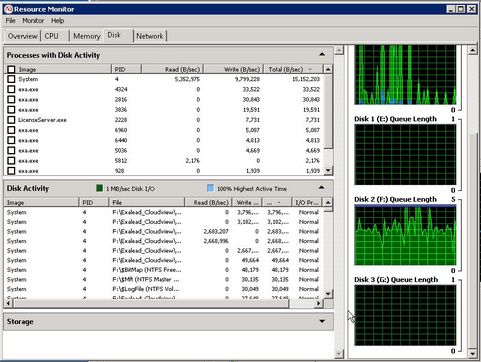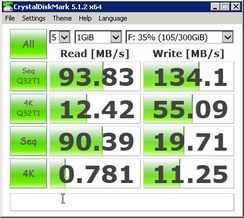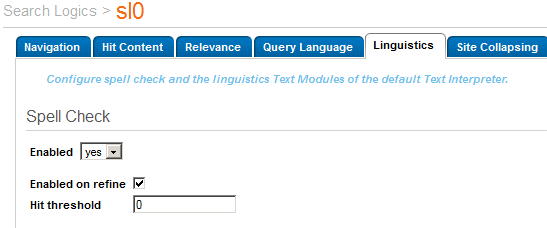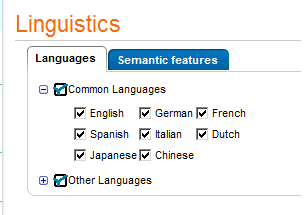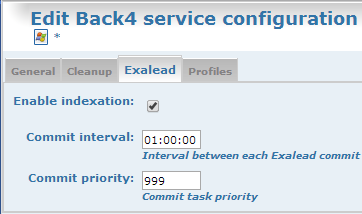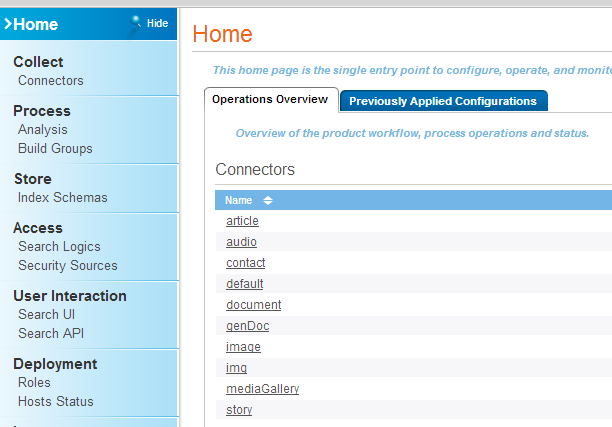Exalead FAQ and troubleshooting
Read Configuring Exalead or download http://tech.teradp.com/tech/download/exalead/doc/Exalead%20Guide.pdf |
The Services applet was open while installing, and that's not allowed. Close the Services applet and reinstall. |
The full error message is: Problem signature: Problem Event Name: BEX64 Application Name: java.exe Application Version: 6.0.270.7 Application Timestamp: 4e253d37 Fault Module Name: StackHash_b4ee Fault Module Version: 0.0.0.0 Fault Module Timestamp: 00000000 Exception Offset: 0000000000000000 Exception Code: c0000005 Exception Data: 0000000000000008 OS Version: 6.1.7601.2.1.0.274.10 Locale ID: 2057 Additional Information 1: b4ee Additional Information 2: b4ee5de6a2322745523997a782b35692 Additional Information 3: 277e Additional Information 4: 277e19c30fbd5f6bb531ec9e027c37c3 Look here for an advice: You can also try to install the version v5.1.12.31472 and then attempt to upgrade it to the latest one. |
1.Make sure the full text engine is enabled in the AppSetting.xml file: 2.Make sure that Exalead configuration in ServerConfig.xml is correct. 3.Make sure that all the Exalead services are up and running. 4.Make sure that no other software takes over ports that Exalead uses. See Troubleshooting 'port in use' problems. 5.Enable Exalead logging in the AppSetting.xml file, and then try to locate error messages in the file on the path defined in add key="Db.LogFileName" value="c:\temp\gn4.log": To enable logging, add Exalead to Db.LogEvents: |
Exalead often throws the error message: Index process: Exalead index commit failed: exceeded the 160 seconds time-out. (ERR2005) Such Exalead error is caused by the disk which is too slow and cannot keep it up. With the performance monitor is possible to see that the disk F is always at 100% and the it has a disk queue lenght of 5: When this value goes above 1 it means that the disk cannot fulfill all the read/write requests and it starts to queue them up. Here's also a disk benchmark that measures the disk performance: The most significant values are those about 4K blocks (random read/write) where the best performance is for 4K Q32T1 (Random 4KiB Read/Write with multi Queues & Threads) and, as you can see, it does not show exciting figures. There is not an easy solution for this. The easiest solution is probably to add a dedicated disk with good performance just for the index. The Exalead errors are not real errors, in the sense that nothing goes really bad or there is data loss. It simply fails to process within the timeout all records that it loads from the indexQueueTable. Increasing the timeout will remove the error but it will not solve the problem: there will always be objects piling up in the indexQueueTable. The problem causes is a delay of some minutes of the indexing process. |
Use EdAdmin4 to review the ServerConfig.xml (access to Application Configuration/Portal Applications and then search for the serverconfig. Locate the line <Exalead BaseCommandUrlV5 and then look at the IP in it: this the IP of the Exalead server. <Exalead BaseCommandUrlV5="http://10.1.1.156:22010/search-api/search" |
From the Exalead interface, search the index with the query "#all" or with "corporate:tree/Top". If there are not results, that means the index is empty. Proceed to reindex all by means of srv4 commands. |
If you are not searching full text, but in a specific field, make sure that the field is configured in the schema to be indexed, with the page rest.ashx?cmd=schema. Then, navigating in objects, make sure that the attribute you are attempting to locate in search has, in the "ExaMetaName" column, its counterpart in Exalead. |
This means the Exalead configuration is out-of-sync with the last schema modifications. Update the configuration with the configureindex command of srv4. |
A possible reason js that the field to sort results is not indexed. Update the schema making sure it gets indexed, or remove it from the configuration |
Open the GN4.log and locate the record of the last search, looking for something like this: /* Exalead Search 2012-02-15T10:29:21.910+01:00 -Search Query: (123) AND (searchKind==0 OR searchKind==1 OR searchKind==3 OR searchKind==4 OR searchKind==5 OR searchKind==6) AND (folderref==1602288) -Sort Name: modifieddate -Start index: 0 -Is mixed SQL search: False */ Search Query is the query sent to Exalead, Sort Name is the attribute used to sort results, Start index indicate the ordinal number of the first returned element (useful to know in which paginated request you find it), Is mixed SLQ search indicates if the query Exalead is mixed to SQL search. In case of a mixed search, the chances are that results are empty because of SQL filters. It is recommended to avoid mixed searches as they're slow. |
Analyze the search log and locate the searchObjectUI which generated the search. Modify it transforming the SQL searches in Exaled searches where possible (by modifying the attribute template and indexing it - if not already indexed.) The searches will be much faster. |
The possible reason is a wrong configuration of searchObjectUI. Example <attribute path="[story.folderRef]" mode="Hidden" op="InSubtree">. In this case, the object filter points to story only, so all non-story objects are filtered out. |
The possible reason is that refinements are not enabled in the ServerConfig. Make sure there's a statement: <Exalead ShowRefinements="true" ... Moreover, make sure that the search is a full-text search. If you are sure that the search is a full-text search, a possible reason is the missing license for Advanced Exalead. |
Enable suggestions in Exalead (Search Logics > sl0 > Linguistics)
If suggestions are missing even if enabled, it means that there are too few objects in the index - suggestions will start to appear when you add more data to the system. |
The results are filtered out by permissions. A possible reason is that you do not have appropriate permissions to list all results. |
For performances reason, the indexing of modified/new elements is delayed for a minute or two. |
Make sure the Back4 service is up and running, and that indexing is enabled in the configuration (Server Configuration > Exalead tab) |
No, you can't. Some names are reserved, e.g. 'text', 'date', 'size'. Moreover, you can't use a name that starts with an underscore character. |
Use this syntax: <ColStyle Name="Relevance" Width="80" Height="0" SortName="Rank"> <CellTemplate> <xp:TextBlock VerticalAlignment="Top" HorizontalAlignment="Left" Text="{Binding Path=[folderObject:Rank]}" /> </CellTemplate> </ColStyle> |
Yes, you can but it is recommended not to do so, as they slow down the searches. |
Use the index command of srv4 to index all folderObjects with a search condition. When done, launch the commitIndex command to make the objects searchable. |
In the Linguistics menu in the Exalead configuration (or during installation).
|
Make a backup of the “config” folder as soon as you installed Exalead so you can restore it lated. If you failed to do so, use the configuration rollback in the Exalead interface, to retur to the previous state. |
All Exalead documentation is available in the installation folder, as well on the http://tech.teradp.com. |
If the reindexing by means of srv4 with conditions gn4:folderObject doesn't seem to finish after unexpectedly long period of time, it may be that the job analysis is stuck. To resolve it, stop Back4 service, remove all the reindexing from the database, remove the Exalead indexes and restart the server. Reindex one-by-one various object classes (images, videos, stories etc). |
|
This means that the listed field is not specified in the schema as full-text field. |
Make sure that no other software is using Exalead ports: from 10000 up. If that doesn't help, try to scratch and rebuild the index, sometimes it solves the problem. If it does not, then re-install Exalead. It takes only few minutes. |
PROBLEM Folder /Archive/Storico with ID 221177 and 108711 objects Folder /Archive/Foto Alba with ID 221185 and 443 objects The Exalead query (folderRef:221177) returns more objects than in the folder (actually it returns all indexed objects that corresponds to the "Number of documents"). The Exalead query (folderRef:221185) returns the correct number of objects: 443. INVESTIGATION You may try to reindex the object, or execute a clean scratch of indexes and then reindex. |
Refinements panel hides if the search is not a full-text search, but it reappears as soon you perform a full-text search. It is a normal behaviour. |
The DB Index Task in Back4 interface may appear with a Red Cross, and when you click the red cross, the message appears. There is no polling procedure '$SYS$-Index' of type 'IndexPoller'. The possible reason may be that the Exalead indexation has been disabled in the Back4 configuration:
Enable it again and then restart Back4. Should this not help, then verify that Exalead is working connecting to the following URL: http:\\your_exalead_server:10001 (if you changed the port during installation, then use that port number). Then verify what's configured about Exalead in the ServerConfig loaded on your system. Use this command: http://localhost/gn4/do.ashx?cmd=config&name=ServerConfig |
To empty a huge gn_IndexQueueTable, and reindex items by range of dates (e.g. from 15-Aug to 29-Aug) use the following steps: 1.Truncate table gn_indexQueueTable 2.Execute srv4 index -conditions "gn4:folderObject[fn:inDays(@creationDate, '2014-08-15', '2014-08-29')]" 3.Force the Indexing in the Exalead console. The table is filled by new objects/or object's changes that are queued for indexing. If they remain in the queue it is likely that the indexing is not active. In that case, check what you are attempting to index. If you added custom items in the schema, that might be the problem. For example, if you added a custom object, and trying to commit changes, but it doesn't exist in the index as connector, the indexing will fail. In such case, open the Exalead administrative interface and click Home. If the object uses custom Exalead fields, you have to start the Exalead configuration all over again as described in the Exalead Guide PDF in the chapter "Reconfigure index" (page #6) |
See also links to the original Exalead documentation
http://tech.teradp.com/tech/download/exalead/doc/Exalead%20Guide.pdf
http://tech.teradp.com/tech/download/exalead/doc

